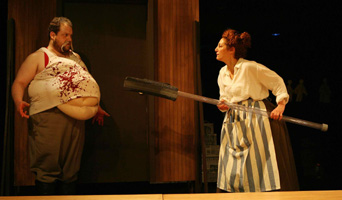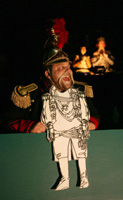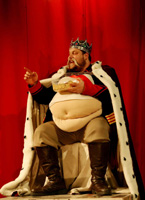
Paulanne Simmons
Alfred Jarry Meets William Shakespeare in "The Polish Play"
 |
| Jordan Gelber an Dana Smith-Croll in "The Polish Play." Photo by James Ambler |
"The Polish Play"
Directed by Henry Wishcamper
Presented by Katharsis Theater Company
Walker Space
46 Walker St. between Church and Broadway
Opened Jan. 19, 2007
Wed. thru Sat. 8 p.m. Sun. 7 p.m.
$18 SmartTix (212) 868-4444 or www.smarttix.com
Closes Feb. 3, 2007
Reviewed by Paulanne Simmons Jan. 19, 2007
It's quite impossible to know what William Shakespeare, who lived four centuries ago, or Alfred Jarry, who died in 1907, would think of Henry Wishcamper's conflation of Jarry's farce, "Ubu Roi," and Shakespeare's tragedy, "Macbeth." Nor should it really matter.
However, it's interesting to note that "Macbeth," written by the mature Shakespeare in 1606, at the end of his career, is a somber play about guilt and retribution. "Ubu Roi," a rambunctious precursor to Surrealism, grew out of a play penned by Jarry, aged 15, and a classmate, with the aim of ridiculing an overbearing math teacher.
 |
| Jordan Gelber in "The Polish Play." Photo by James Ambler |
Comedy and tragedy struggle in this production. And watching the joyous shenanigans in "The Polish Play," it might seem that Jarry comes out the winner. But, as always, Shakespeare's language breaks through all obstacles and certainly holds its own. So in the end, it's very much a draw.
With the help of puppets ranging from miniature marionettes (who engage hilariously in an Olympic race accompanied by the theme from "Chariots of Fire") to grotesque Grand Guignol, and the clever and comic sound effects Bart Fasbender (also the composer) creates onstage, "The Polish Play" tells the story of the idiot tyrant Pere Ubu (Jordan Gelber).
Like the more refined by equally evil Macbeth, Pere Ubu is egged on by his wife, Mere Ubu (Dana Smith-Croll) and stirred up by the Three Weird Sisters. He slaughters the meek King Wenceslas and ascends to the Polish throne. The noble MacDuff (Torsten Hillhouse) delivers the comeuppance.
With the many scene changes characteristic of the Shakespearean stage and Jarry's frenetic pace, "The Polish Play" might have easily descended into chaos. But Wishcamper (whose credits include Keen Company's "Pullman Car Hiawatha" and Gallery Players "School for Scandal") does a truly amazing job making the absurd make sense. He does this through narration (a summary of each scene is displayed on an easel and read by a member of the company), a faithful rendition of crucial scenes from both plays, and an invisible but restraining hand on his excellent, energetic and mostly youthful cast.
 |
| Jordan Gelber in "The Polish Play." Photo by James Ambler |
Gelber, a veteran of "Avenue Q," his amply girth augmented by prodigious padding, farts, defecates and emits obscenities in a manner much more like Ubu than Macbeth. But Smith-Croll delivers Mere Ubu/Lady Macbeth's best lines in a grand style that reveals her Shakespearean credits (she appeared in The New York Shakespeare Festival's "Richard III" and Yale Repertory Theatre's "Othello") and makes one want to hear more.
Katharsis Theater Company, which produced "The Polish Play," specializes in revitalizing plays from the classical canon by presenting productions that are both faithful to the original text and original in point of view and interpretation.
In many ways, "The Polish Play" has the manic exuberance of a college production. But thanks to the professionalism of the cast and Wishcamper's wisdom, "The Polish Play" goes over the top but never falls off the cliff.
| lobby | search
| home | cue-to-cue |
discounts | welcome | film
| dance | reviews |
| museums | NYTW
mail | recordings | coupons |
publications | classified |
